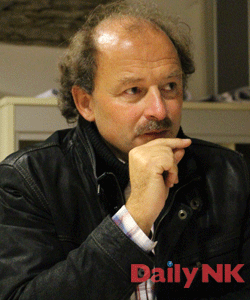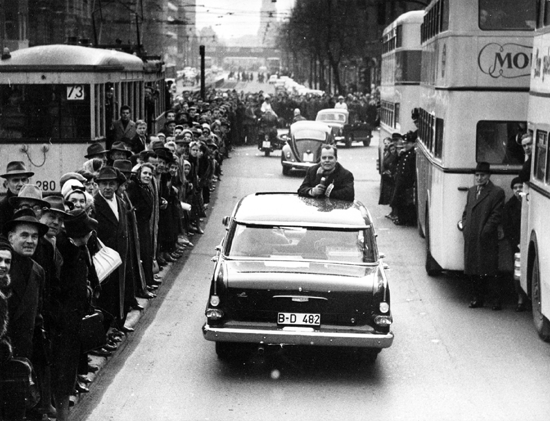 This photograph shows two RIAS reporters near two East German military personnel in Brandenburg at the scene of the Berlin Wall one week after it had fallen. Image: courtesy of RIAS |
After the division of Germany in the Cold
War, radio broadcasts from the West to the East became an essential lifeline
and unifying force for the separated German peoples. Western and Eastern media
experts agree that, as the East Germans suffered from poverty and oppression
under the communist dictatorship, radio broadcasts from the West helped them
dream of hope, prosperity, and freedom.
In particular, Eastern listeners
passionately followed and loved the Western Radio Broadcast RIAS and the
popular the Tagesschau news program from the publically produced ARD station.
These programs gave light and hope to people who were living under the boot of
a cruel and oppressive regime.
On this topic, Detlef Kühn, the former
director of Sachsen Radio, said, “The Western broadcasts showed the outside
world in realistic terms. Because of this, the broadcasts became the most
important source of information for East German people, especially when
compared to the low quality information offered by the strictly censored media
in East Germany. Unlike Western media, Eastern broadcasts did not play any
important role in the unification process.”
 Robert Lebegern (pictured left) is director of the
Robert Lebegern (pictured left) is director of the
Deutsch-Deutschen Museum Mödlareuth (Mödlareuth Border Museum). He said, “East
Germany was a Socialist nation with thorough control over media production.
Just like in North Korea today, East Germany used to exert intense ideological
pressure on its people. However, through the Western radio broadcasts, the
people gradually began to form their own opinions about the world.”
In September of 1955, the East German
Supreme Court ruled that West German Produced radio broadcaster RIAS was a tool
of spies. This allegation might not be based on fact, but it is a reflection of
the immense social impact of RIAS radio, which had the power to pump ideas
about democracy and freedom and begin to influence the way people thought about
political and history.
The reason West German media was able to
have this sort of influence over the Easterners is because the publishers
maintained an objective and neutral stance when reporting and delivering the
news. The experts agree that by sticking to these core journalistic principles,
the media outlets were able to expedite and add momentum to the peaceful unification
process. Not through bombs, bullets, or coercion, but through hearts and minds.
South Korea to North Korea broadcasts need
to match the influence of West German broadcasts
Coming face to face with the soft power of
these broadcasts, the East German Stasi secret police (which served a similar
role as North Korea’s State Security Department) were mobilized to
investigate and surveil instances of people tuning into the forbidden radio.
The Stasi investigated elementary, middle, and high school children about the
shape of the clock of the television news that their parents watched to
determine if they were watching West German television. The East and West
German programs had differently shaped clocks, which made for an innocuous
sounding yet conclusive way to determine which broadcast the parents were
tuning into.
These drastic attempts to stop the flow of
influential programming from abroad shows just how afraid the East German
regime was. They even used signal jamming just like North Korea does. But this
did nothing to blunt the affection that the East German residents had for the
foreign broadcasts.
 A Stasi prison in Dresden, Germany. East German people caught listening to forbidden media were thrown in jail, but this did little to put a dent in the public’s interest. Image: Daily NK. |
According to a 1985 survey of 250 East
Germans by Bamberg University, 94% of those who had television tuned into
Western broadcasts. They preferred news programs such as Tagesschau over
variety and entertainment shows. News programs which addressed East Germany’s
problems had the highest viewership figures. Radio was the same. Passionate
fans of the RIAS station even used various ways to send postcards to the station
headquarters across the border.
An anonymous official from the German
Federation Bureau of Public Information said, “Because the West German media
sources accurately and precisely reported how the East German authorities and
the Stasi were oppressing the people, they were able to play an important part
in changing the East German people’s mentality and political consciousness.
North Korean people know that their lives are difficult What they don’t
know is how their lives could get better. South Korean media could help in that
regard. That would make a big difference when it comes time for sweeping
political and social changes.”

Dr. Jürgen Reiche (pictured right) is director of the
Leipzig Forum of Modern History. He said, “All the illusions and misperceptions
that East Germans had about capitalism were rectified by their interaction with
foreign media. Easterners were especially forced to confront the hard reality
of their own situation when they compared their lifestyle with those of the
average West German people they heard about through Western media. In much the
same way, North Koreans have the same sorts of restrictions on accessing
foreign media. And so Southern broadcasts to North Korea will have a large
impact on their way of thinking.”
South-North broadcasts will play a role in
changing the North Korean regime
West-to-East TV and radio broadcasts played
an important part in the peaceful revolution of 1989. Through the media, 16
million East Germans joined the various pro-democracy protests occurring around
the country.
Western media was able to fan the flames of
revolutionary courage in East Germany by serving as an information provider, a
democracy advocate, and by providing continuous and up to the minute reports of
protests going on throughout the world and East Germans who escaped via Poland, Hungary, and Czechoslovakia.
Dr. Jürgen Reiche said, “We strived to show
the protests occurring inside East Germany to as many East Germans as we could.
That way they would hear the reports and head out to the streets. As many as
100,000 people participated. Western media played an important role in
increasing the size of those protests. And in that regard, also helped to
contribute to the unification of divided Germany.
Robert Lebegern added, “In
1989, when the protests were starting to catch on, that’s when the Western
media really grew to take on its most important function. The influence of the
media helped to increase the public antipathy towards the communist regime and
facilitate the peaceful protests that led to regime change.”
Director Lebegern followed by explaining that it is hard to
imagine how unification and the peaceful revolution could have occurred without
the tremendous contributions made by Western media broadcasts into the
reclusive East German state. In this exact same fashion, South-to-North
broadcasts on the Korean peninsula have the power to show North Koreans the
power of political and economic freedom. “This is turn serves as a foundation
for the kind of attitude shifts that lead to peaceful revolution,” he asserted.
Son Gi Woong from the Korea Institute for
National Unification (KINU) also weighed in, stating, “East Germany was taken in under the West
German political system, so we sometimes call that unification through
absorption. But I don’t think that is the best term. After the East German people
witnessed how the Westerners were living, they purposefully went after the
Berlin Wall. South Korea needs to do the same for North Koreans through the
media. To show them what a free democracy looks like. However, if we
really want to insist that North Korea should fundamentally be a country of the
people, with the freedom to make their own decisions, then we can only give
them the information they need to make that choice. After that, we need them to
make the decision for themselves.”
 RIAS was on the scene on February 2, 1962 when American President John F. Kennedy visited Berlin. Image: RIAS |
*This article has been brought to you
thanks to support from the Korea Press Foundation.

















